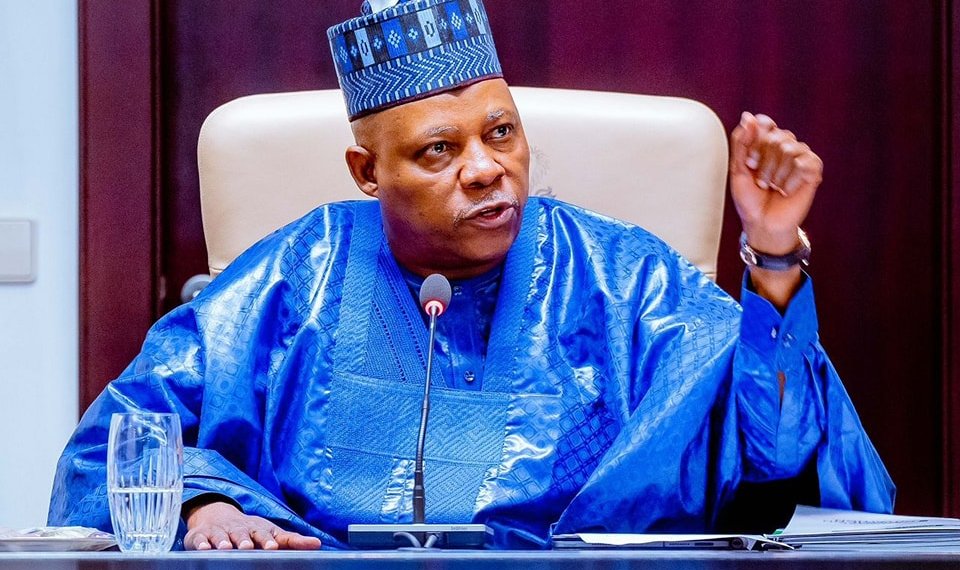Vice president Shettima has lamented the percentage of malnutrition in Nigerian children and called for a unified response

Vice President Kashim Shettima has raised alarm over the devastating toll of malnutrition on Nigeria’s children, stating that 40 percent of children under the age of five are being deprived of their full physical and cognitive potential due to poor nutrition.
Speaking through Senator Ibrahim Hadejia, Deputy Chief of Staff to the President (Office of the Vice President), Shettima made this known at the National Summit on Nutrition and Food Security organized by the House Committee on Nutrition and Food Security, as part of the House of Representatives Open Week activities in Abuja.
He said the Federal Government has launched the Nutrition 774 Initiative—a community-based, grassroots-driven strategy designed to combat nutrition challenges, especially in underserved parts of the country.
“Under the Renewed Hope Agenda of President Bola Ahmed Tinubu, nutrition has been repositioned as a core component of our national development strategy,” Shettima noted.
“The Nutrition 774 Initiative, already endorsed by the National Council on Nutrition, reflects a renewed commitment to tackling malnutrition through a localized, accountable, and inclusive approach.”
As Chairman of the National Council on Nutrition, Shettima emphasized that the initiative aims to galvanize political will, secure sustainable financing, enhance multi-level collaboration, and foster accountability across the board.
He acknowledged the contributions of partners such as the World Bank, UNICEF, Médecins Sans Frontières (MSF), the Global Alliance for Improved Nutrition (GAIN), and Nutrition International, while calling for an end to fragmented interventions.
“We must move from disjointed responses to a unified national framework. Only a single, coordinated approach with clear accountability and joint action can deliver meaningful, long-term impact,” he said.
He further advocated for increased and consistent budgetary allocation for nutrition, robust legislative oversight, and a shift in national consciousness to view nutrition not as a charitable act, but as a fundamental matter of social justice.
Malnutrition Costs Nigeria $56bn Annually
In his remarks, Speaker of the House of Representatives, Rep. Abbas Tajudeen, warned that malnutrition is exacting a massive economic toll on Nigeria, costing the nation approximately 12.2 percent of its Gross National Income—an estimated $56 billion annually.
He noted that post-harvest losses alone amount to $2 billion each year, further worsening food insecurity.
“These figures are staggering. We must move beyond policy statements to real action at the grassroots,” Abbas stated.
“The Committee on Nutrition and Food Security is working with all 36 states to strengthen systemic responses through capacity-building and multi-sectoral collaboration.”
The speaker also raised concerns about multiple levies on food transport, which he said are artificially inflating food prices and exacerbating hunger. He stressed the need for transparency from development partners and advocated legislative scrutiny of external loans taken to fund nutrition interventions.
Post-Harvest Losses Surpass Nutrition Budgets
Chairman of the House Committee on Nutrition and Food Security, Rep. Chike Okafor, echoed the speaker’s concerns, noting that stunting, low birth weight, and anemia—conditions linked to malnutrition—carry severe economic and public health implications.
“According to the World Bank and Nutrition International, the economic burden of malnutrition in Nigeria is over $56 billion annually,” Okafor said.
“More troubling is that our post-harvest food losses, estimated at $2 billion yearly by the FAO, are greater than the combined nutrition budgets of the Ministries of Agriculture, Health, Education, and Women Affairs. This is simply unsustainable.”
To address the crisis, Okafor said the committee is engaging stakeholders across states and has begun strategic capacity-building sessions to improve legislative knowledge and oversight of food and nutrition issues.
He proposed institutionalizing these sessions in partnership with the National Institute for Legislative and Democratic Studies (NILDS) and development partners.
“Enhanced oversight is critical,” he emphasized. “We must ensure that nutrition-related funds—whether from local or international partners—are effectively utilized, aligned with national guidelines, and transparently administered.”
Okafor also welcomed the enactment of the Nigeria Tax Administration Act 2025, which introduces a harmonized tax collection framework, and called for nationwide public sensitization on its benefits, particularly its impact on nutrition and food systems.
“Nutrition must be a national priority—not only in words but in budgeting, planning, and execution,” he concluded.

